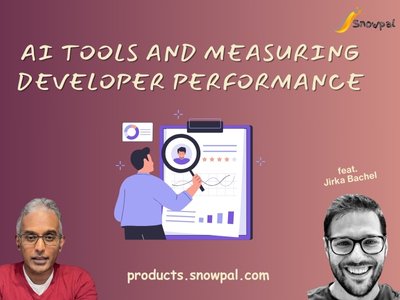AI Tools and Measuring Developer Performance (feat. Jirka Bachel)
Developer performance is a blend of quantitative and qualitative factors. AI can evaluate developer performance differently than traditional metrics. AI tools can enhance coding efficiency.
In this episode, Krish Palaniappan interviews Jirka Bachel, CEO of Navigara, about the innovative use of AI in measuring software developer performance. They discuss the shortcomings of traditional metrics, such as lines of code and merge request times, and emphasize the importance of peer feedback and context in evaluating developer contributions. The conversation also explores cultural differences in how developers present their work, highlighting the significance of effective communication in showcasing skills and achievements. They discuss the dynamics of developer teams, the importance of presentation skills, and the impact of AI on developer performance. They explore how to identify hidden talent within teams, the significance of measuring developer metrics, and the challenges of overengineering in code.
The discussion also delves into the integration of AI tools in software development, the importance of security and privacy in code analysis, and the evolving landscape of software development as AI continues to play a larger role. They discuss the evolving landscape of software development, particularly in light of AI advancements. They explore the emergence of new roles such as 'builders' who may not need extensive programming knowledge, the importance of understanding code for effective problem-solving, and the potential impact of AI on job markets and outsourcing. The discussion also highlights disparities in software quality across different industries and the changing dynamics of hiring talent globally.
They discuss the evolving landscape of software development, particularly in the context of AI's impact on outsourcing, hiring practices, and team dynamics. They explore the importance of evaluating developer skills, the role of communication in a tech-driven world, and the changing nature of engineering roles as automation increases. The discussion emphasizes the need for curiosity and adaptability among engineers as they navigate these changes.
Takeaways
AI can evaluate developer performance differently than traditional metrics.
Measuring performance by lines of code is misleading.
Peer feedback is crucial for assessing developer quality.
Cultural differences affect how developers present their work.
Effective communication can enhance perceived performance.
The context of a project influences performance metrics.
Companies should define their own performance metrics.
Presentation skills are vital in showcasing developer contributions.
Understanding the audience is key to effective communication.
Developer performance is a blend of quantitative and qualitative factors. Czech developers often underestimate the importance of showcasing their skills.
Presentation skills are crucial, even in product teams.
Identifying hidden talent can significantly benefit a company.
AI tools are changing the performance landscape for developers.
Measuring developer metrics is essential for team improvement.
Overengineering can lead to technical debt and inefficiencies.
Code quality is a critical factor in software development.
Security and privacy are paramount in code analysis.
The future of development will involve more AI collaboration.
Understanding the dynamics of developer teams can enhance productivity. A new role called 'builder' will emerge in software development.
Understanding code is essential for effective problem-solving.
AI can generate code but requires human oversight.
The future of software jobs may not require traditional programming skills.
Companies are realizing they don't need as many developers as before.
Not all software is created equal; quality varies by industry.
Outsourcing may diminish as AI tools become more prevalent.
The tech industry will continue to evolve with AI advancements.
Hiring top talent may require broader searches beyond local markets.
The disparity in software quality is significant across different sectors. People in Seattle face higher living costs affecting salaries.
Remote work fosters team culture and friendships.
Outsourcing needs may evolve with AI advancements.
AI tools can enhance coding efficiency but require skilled oversight.
Evaluating developer skills is crucial for hiring decisions.
Communication skills are becoming increasingly important in tech roles.
The composition of software development teams is changing.
Curiosity drives engineers to adapt and learn continuously.
Automation may reduce the number of engineers needed.
Credibility of developers is essential in hiring processes.
Podcast
Transcript
Snowpal Products
Backends as Services on AWS Marketplace
Mobile Apps on App Store and Play Store
Web App
Education Platform for Learners and Course Creators



